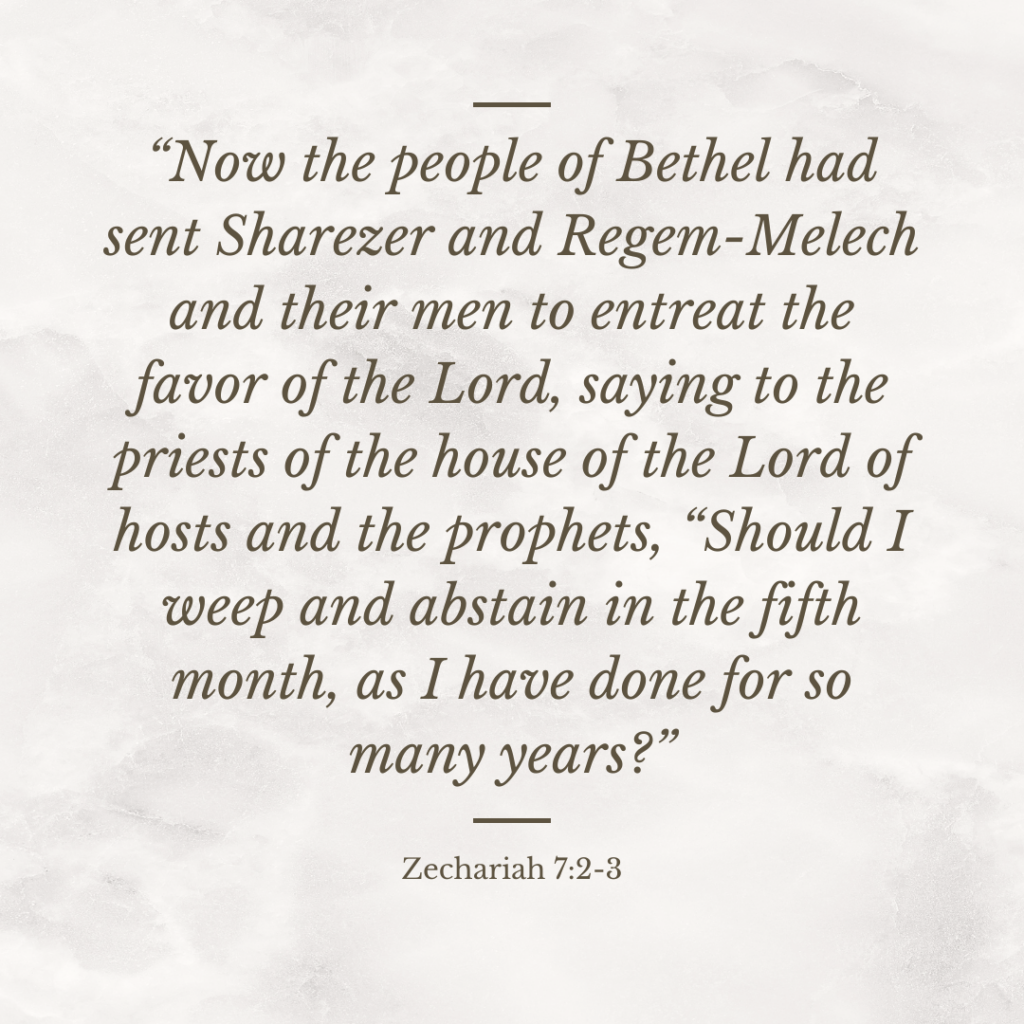Two-minute read.

“Now the people of Bethel had sent Sharezer and Regem-Melech and their men to entreat the favor of the Lord, saying to the priests of the house of the Lord of hosts and the prophets, “Should I weep and abstain in the fifth month, as I have done for so many years?” Zechariah 7:2-3
To fast or not to fast?
During exile, the Israel nation fasted and prayed, but with the temple near completion, it didn’t seem necessary to continue the practice. The Jews instituted a fast day to commemorate the fall and destruction of Jerusalem and the temple. Fasts occurred in the fourth, fifth, seventh, and tenth months. At first, the people felt remorse, but as time passed, the tradition became a mere formality, prompting the question.
Fasting can become a routine. A few years ago, I decided to fast every Monday. My spiritual mentor told me how she practiced fasts one day a week, praying for her husband and children. Loving the idea, I decided to institute the practice into my spiritual journey. The fast became less meaningful and more of a chore as time passed. Eventually, I stopped my Monday routine because I realized it had lost its original purpose. Feelings of resentment started to invade my heart, causing me to draw away from the Lord instead of closer to Him.
Maintaining a soft heart towards the Lord and others takes vigilance. Allowing God to search our hearts and reveal bitter roots helps to keep our souls pure. Using traditions to re-engage with our Creator regularly shouldn’t become a burden. A sign on a local business gave me pause: “Practice makes perfect. Be careful what you practice.” Doing things to make yourself look good in front of others versus doing them to connect with God makes a huge difference in our spiritual journey.
The Pharisees fasted and prayed to make themselves look good to the religious community. Jesus called them out on their wrongful practice with love, and they didn’t like it. Coming to the Lord with a contrite heart will cause mountains to move. But doing things for the glory of self won’t have any effect. God knows our motivations better than we do sometimes. We can’t fool Him, nor should we try.
Fasting and prayer in your spiritual journey should enrich your walk with God. If the practice becomes more of a task than an act of faith, reevaluate your motivation. Ask the Lord for guidance. Legalism can cause separation. But a sincere heart desiring a deeper relationship with God will approach the spiritual practice with a sense of anticipation for what the Lord will do with your self-sacrifice.
Journal Questions:
- How can I apply today’s devotion to my life?
- How has fasting become a chore for you?
- What can you do to re-invigorate fasting as a spiritual practice?
Prayer:
Lord, thank You for pointing out the pitfalls that can occur if we make fasting a formality instead of the way You intended. As we practice this act of faith, give us an expectant heart for what You will do with our obedience. Mold and shape us into faithful servants of Christ as we give our lives to You. IJNIP. Amen
